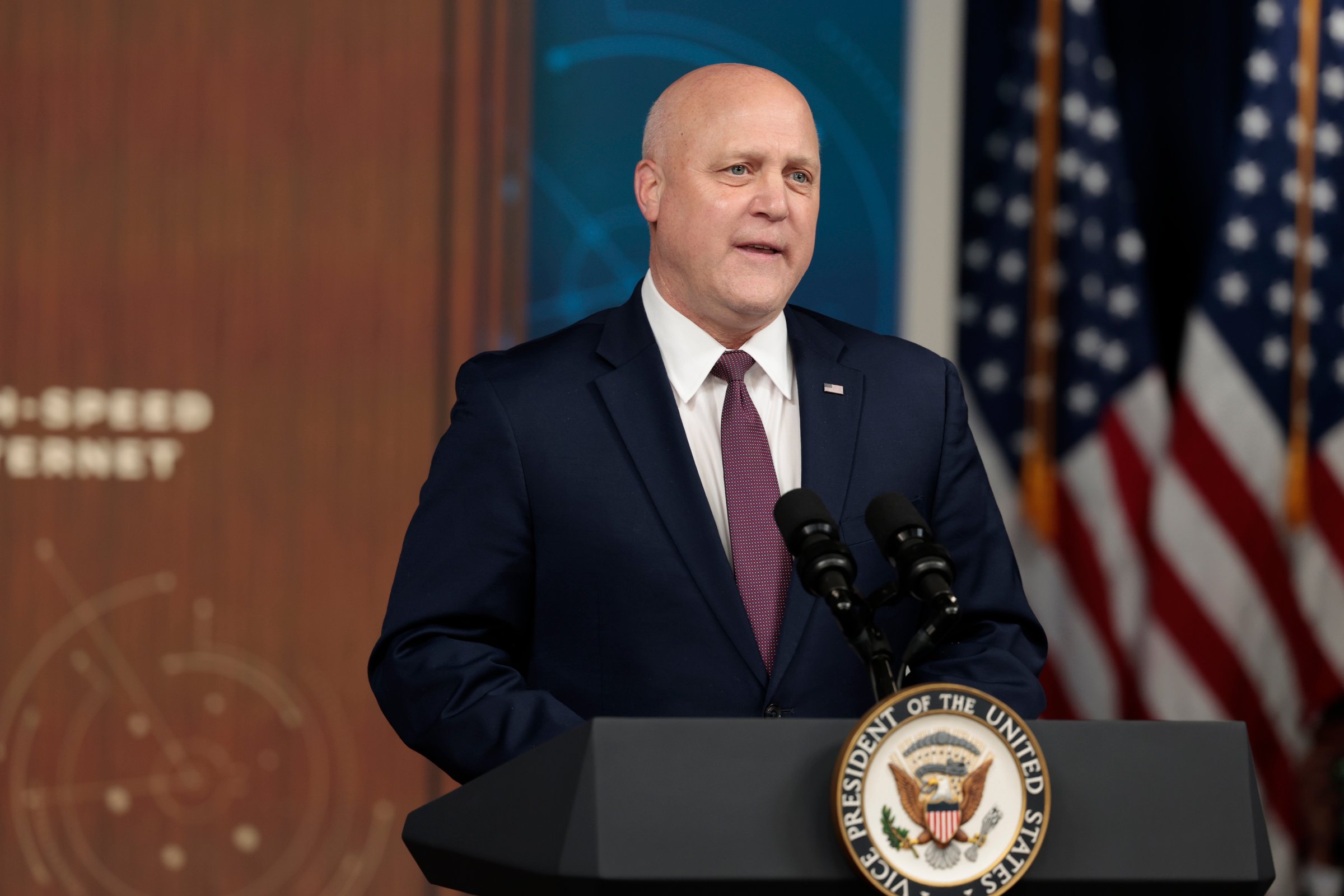
It may seem unusual for a Senior White House Advisor to be telling people that Washington is broken just days after President Joe Biden announced his bid for re-election. But when their job involves regularly working with lawmakers across the aisle, it starts to make sense.
During a TIME100 Talks brunch on Saturday ahead of the White House Correspondents Dinner, former New Orleans Mayor Mitch Landrieu, who now oversees the implementation of the landmark $1.2 trillion infrastructure law, told TIME’s senior White House correspondent Brian Bennett why he’s displeased with Republican lawmakers who opposed the bill but have been quick to offer praise and claim credit when their local projects get a share of the cash.
“They shouldn’t take the money and take credit for building something, and then say the federal government spends too much money,” Landrieu said. “That’s why Washington is broken.”
Landrieu, who has spent the past year on a nationwide tour to promote Biden’s infrastructure law, spoke to TIME in a wide-ranging interview, answering questions about the implementation of the infrastructure package, working with lawmakers who opposed the government spending, the rollout of new electric vehicle charging stations amid calls to repeal the various tax incentives, and Biden’s re-election prospects in 2024.
During the discussion, Landrieu explained that the landmark $1.2 trillion infrastructure law that Biden signed in 2021 promises to rebuild the nation’s roads and bridges, expand broadband service, put more electric vehicles on the road and provide millions of Americans with cleaner drinking water. The spending package, which passed with overwhelming bipartisan votes, marked the biggest infrastructure bill in decades.
But at least 14 congressional Republicans who voted against the bipartisan infrastructure bill have tried to take credit for projects made possible by it, according to a review by CNN. The list includes Rep. Steve Scalise of Louisiana, the second-ranking House Republican, who has touted flood mitigation measures that will get funding under the law, and Rep. Clay Higgins of Louisiana, who has promoted funding for waterways in his district.
“If you think it’s such a great idea, then what you ought to do to be honest with the public is…to say, ‘you know what really works in America: When the federal government shows up and the state government shows up, we all collectively work together and we produce a beautiful result for you,” Landrieu said. “Don’t you want to do more of that?”
The bill is set to provide tens of billions of dollars to projects such as rail tunnels under the Hudson River, Everglades restoration work in Florida and a bridge replacement in Pennsylvania. But it may be years before federal, state and local governments decide which specific projects get the vast majority of the money, and even longer before many Americans see the results. Landrieu acknowledged that many of the spending decisions rest with Republican governors who oppose Biden’s push to use much of the money for projects that counteract climate change or redress the legacies of racial discrimination.
When asked about how the White House plans to supply enough technical workers to install 500,000 electric vehicle charging stations in the next seven years, Landrieu said that part of the solution is for employers to provide training, health care, and childcare to get more people into the workforce. “Childcare is infrastructure,” he said. “In every meeting that I’ve been in with women, every one of them said the most important thing for me in order to be able to get into the workplace is childcare.” The White House already plans to require companies applying for federal grants from the CHIPS and Science Act, aimed at boosting domestic semiconductor chips manufacturing, to provide access to affordable child care for their workers.
The conversation comes less than a week after Biden formally launched his re-election campaign with the release of a 3-minute video, during which he asked voters to give him more time to “finish the job” he started in 2021. The President plans to run on his legislative record, making a case to voters that their lives have improved because of legislation he helped pass, including the historic bipartisan infrastructure package that would have seemed improbable when he took office.
Yet his poll numbers are still in the low 40s, dragged down by voters’ concerns over Biden’s age. The President turned 80 in November and, if elected to a second term, would finish out his service at the age of 86. “That’s just such an interesting question,” Landrieu said on Saturday when discussing concerns over Biden’s age. “I’d ask why are you fixated on that number, when he created 12.1 million jobs, 800,000 manufacturing jobs, the lowest unemployment rate in the last 50 years, and the most significant legislation to move us into a clean energy economy to deal with the climate crisis that is second to none.”
When asked about the lessons he learned from serving in the Louisiana legislature for 16 years, Landrieu said that he made it a point to have lunch twice a year with the most conservative people in the House, during which he would try to find common ground. But it’s not always that easy, he noted.
“Everybody in America thinks that Congress works like this. Someone comes up with an idea, 435 members sit on the House floor and they have this wonderful debate, and then at the end of it, they vote and the majority wins. Washington doesn’t work that way.”
More Must-Reads from TIME
- Cybersecurity Experts Are Sounding the Alarm on DOGE
- Meet the 2025 Women of the Year
- The Harsh Truth About Disability Inclusion
- Why Do More Young Adults Have Cancer?
- Colman Domingo Leads With Radical Love
- How to Get Better at Doing Things Alone
- Michelle Zauner Stares Down the Darkness
Write to Nik Popli at nik.popli@time.com